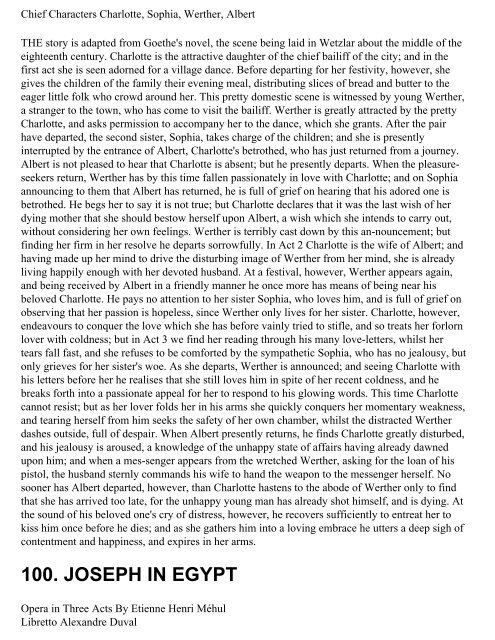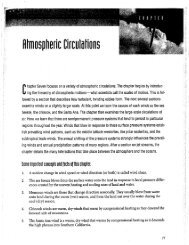Opera Plots I - MDC Faculty Home Pages
Opera Plots I - MDC Faculty Home Pages
Opera Plots I - MDC Faculty Home Pages
Create successful ePaper yourself
Turn your PDF publications into a flip-book with our unique Google optimized e-Paper software.
Chief Characters Charlotte, Sophia, Werther, Albert<br />
THE story is adapted from Goethe's novel, the scene being laid in Wetzlar about the middle of the<br />
eighteenth century. Charlotte is the attractive daughter of the chief bailiff of the city; and in the<br />
first act she is seen adorned for a village dance. Before departing for her festivity, however, she<br />
gives the children of the family their evening meal, distributing slices of bread and butter to the<br />
eager little folk who crowd around her. This pretty domestic scene is witnessed by young Werther,<br />
a stranger to the town, who has come to visit the bailiff. Werther is greatly attracted by the pretty<br />
Charlotte, and asks permission to accompany her to the dance, which she grants. After the pair<br />
have departed, the second sister, Sophia, takes charge of the children; and she is presently<br />
interrupted by the entrance of Albert, Charlotte's betrothed, who has just returned from a journey.<br />
Albert is not pleased to hear that Charlotte is absent; but he presently departs. When the pleasureseekers<br />
return, Werther has by this time fallen passionately in love with Charlotte; and on Sophia<br />
announcing to them that Albert has returned, he is full of grief on hearing that his adored one is<br />
betrothed. He begs her to say it is not true; but Charlotte declares that it was the last wish of her<br />
dying mother that she should bestow herself upon Albert, a wish which she intends to carry out,<br />
without considering her own feelings. Werther is terribly cast down by this an-nouncement; but<br />
finding her firm in her resolve he departs sorrowfully. In Act 2 Charlotte is the wife of Albert; and<br />
having made up her mind to drive the disturbing image of Werther from her mind, she is already<br />
living happily enough with her devoted husband. At a festival, however, Werther appears again,<br />
and being received by Albert in a friendly manner he once more has means of being near his<br />
beloved Charlotte. He pays no attention to her sister Sophia, who loves him, and is full of grief on<br />
observing that her passion is hopeless, since Werther only lives for her sister. Charlotte, however,<br />
endeavours to conquer the love which she has before vainly tried to stifle, and so treats her forlorn<br />
lover with coldness; but in Act 3 we find her reading through his many love-letters, whilst her<br />
tears fall fast, and she refuses to be comforted by the sympathetic Sophia, who has no jealousy, but<br />
only grieves for her sister's woe. As she departs, Werther is announced; and seeing Charlotte with<br />
his letters before her he realises that she still loves him in spite of her recent coldness, and he<br />
breaks forth into a passionate appeal for her to respond to his glowing words. This time Charlotte<br />
cannot resist; but as her lover folds her in his arms she quickly conquers her momentary weakness,<br />
and tearing herself from him seeks the safety of her own chamber, whilst the distracted Werther<br />
dashes outside, full of despair. When Albert presently returns, he finds Charlotte greatly disturbed,<br />
and his jealousy is aroused, a knowledge of the unhappy state of affairs having already dawned<br />
upon him; and when a mes-senger appears from the wretched Werther, asking for the loan of his<br />
pistol, the husband sternly commands his wife to hand the weapon to the messenger herself. No<br />
sooner has Albert departed, however, than Charlotte hastens to the abode of Werther only to find<br />
that she has arrived too late, for the unhappy young man has already shot himself, and is dying. At<br />
the sound of his beloved one's cry of distress, however, he recovers sufficiently to entreat her to<br />
kiss him once before he dies; and as she gathers him into a loving embrace he utters a deep sigh of<br />
contentment and happiness, and expires in her arms.<br />
100. JOSEPH IN EGYPT<br />
<strong>Opera</strong> in Three Acts By Etienne Henri Méhul<br />
Libretto Alexandre Duval













